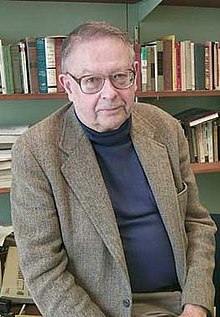Kenneth Neal Waltz | |
|---|---|
 | |
| Born | June 8, 1924 Ann Arbor, Michigan, U.S. |
| Died | May 12, 2013 (aged 88) New York City, New York, U.S. |
| Alma mater | |
| Era | Contemporary philosophy |
| Region | Western Philosophy |
| School | Neorealism |
| Institutions | University of California, Berkeley Columbia University |
| Thesis |
|
| Academic advisors | William T. R. Fox |
Main interests | International security, nuclear security, anarchy |
Notable ideas | Structural realism, defensive realism |
| Military career | |
| Allegiance | United States |
| Branch | United States Army |
| Years of service | 1944 – 1946 |
| Rank | First lieutenant |
| Battles / wars | World War II Occupation of Japan |
Kenneth Neal Waltz (/wɔːlts/; June 8, 1924 – May 12, 2013[1]) was an American political scientist who was a member of the faculty at both the University of California, Berkeley and Columbia University and one of the most prominent scholars in the field of international relations.[2] He was a veteran of both World War II and the Korean War.[3]
Waltz was one of the original founders of neorealism, or structural realism, in international relations theory and later became associated with the school of defensive neorealism. Waltz's theories have been extensively debated within the field of international relations.[4] His 1979 book Theory of International Politics is the most assigned book in International Relations graduate training at U.S. universities.[5]
- ^ Martin, Douglas (May 19, 2013). "Kenneth Waltz, Foreign-Relations Expert, Dies at 88". The New York Times. p. A22.
- ^ Susan Peterson and Michael J. Tierney with Daniel Maliniak (August 2005). Teaching and Research Practices, Views on the Discipline, and Policy Attitudes of International Relations Faculty at U.S. Colleges and Universities Archived February 16, 2006, at the Wayback Machine
- ^ "Kenneth N. Waltz (1924–2013)". Arnold A. Saltzman Institute of War and Peace Studies. Archived from the original on 23 December 2017. Retrieved 19 November 2014.
- ^ Hollander, Jason (March 28, 2000). "Prof. Kenneth N. Waltz's Political Realism Wins James Madison Lifetime Achievement Award In Political Science". Office of Communications and Public Affairs, Columbia University.
- ^ Colgan, Jeff D. (2016-09-01). "Where Is International Relations Going? Evidence from Graduate Training". International Studies Quarterly. 60 (3): 486–498. doi:10.1093/isq/sqv017. ISSN 0020-8833.